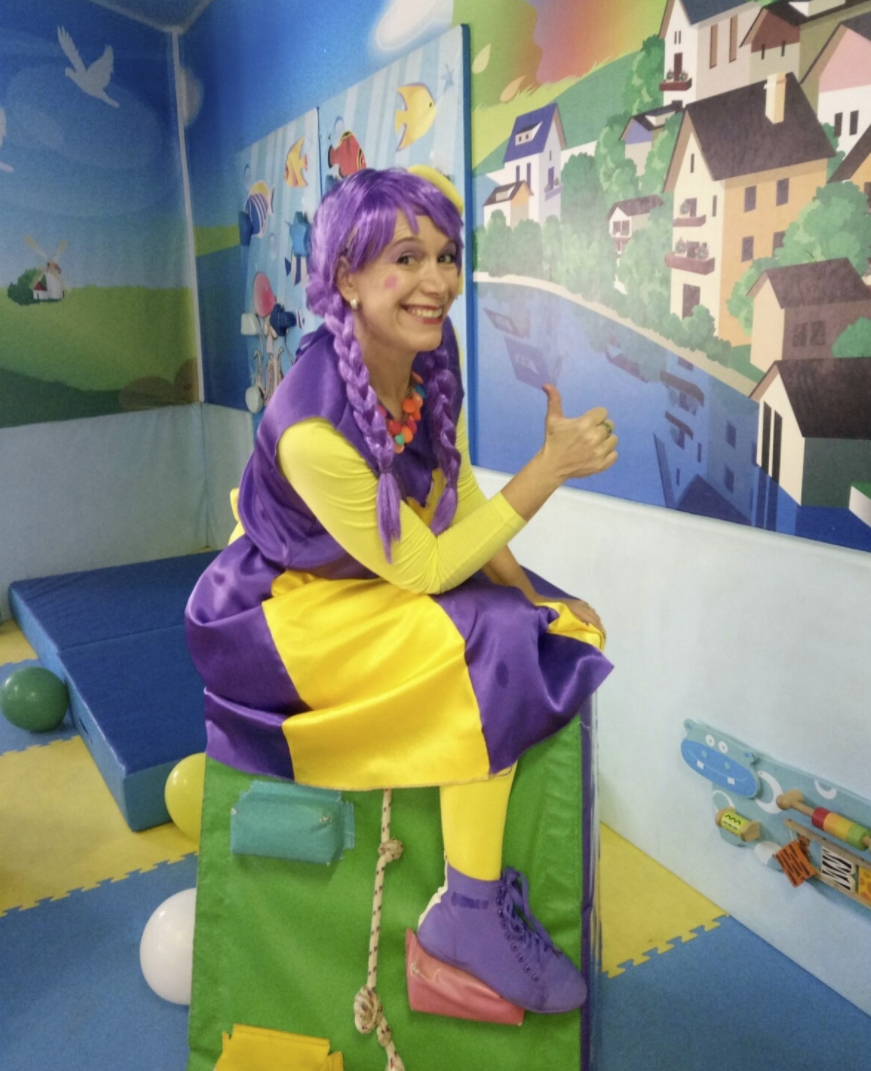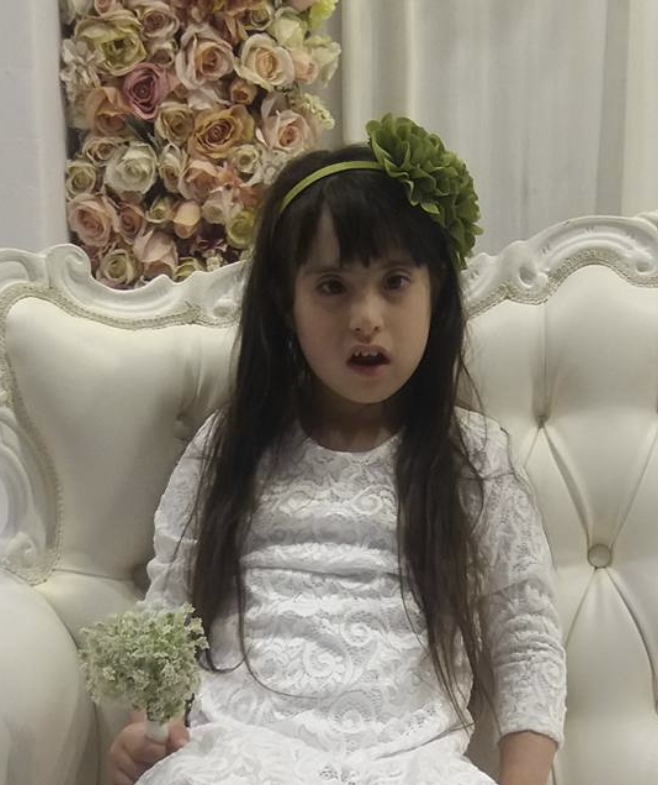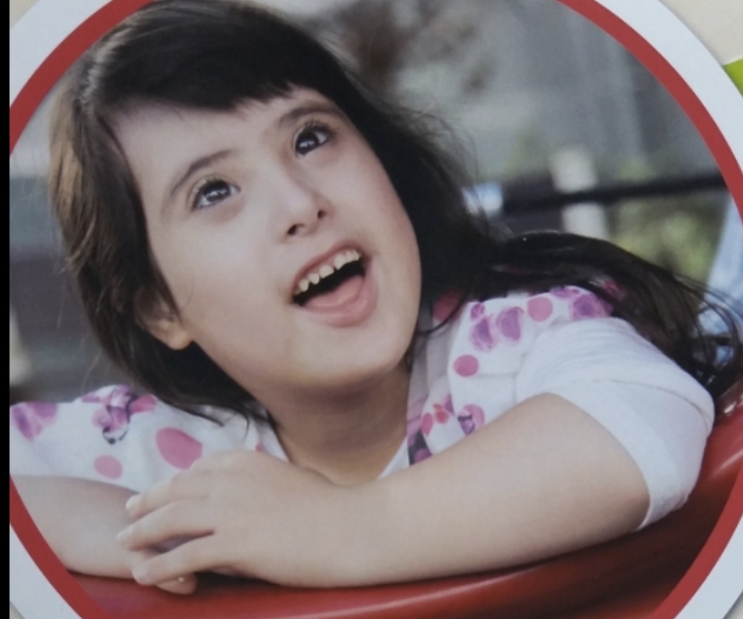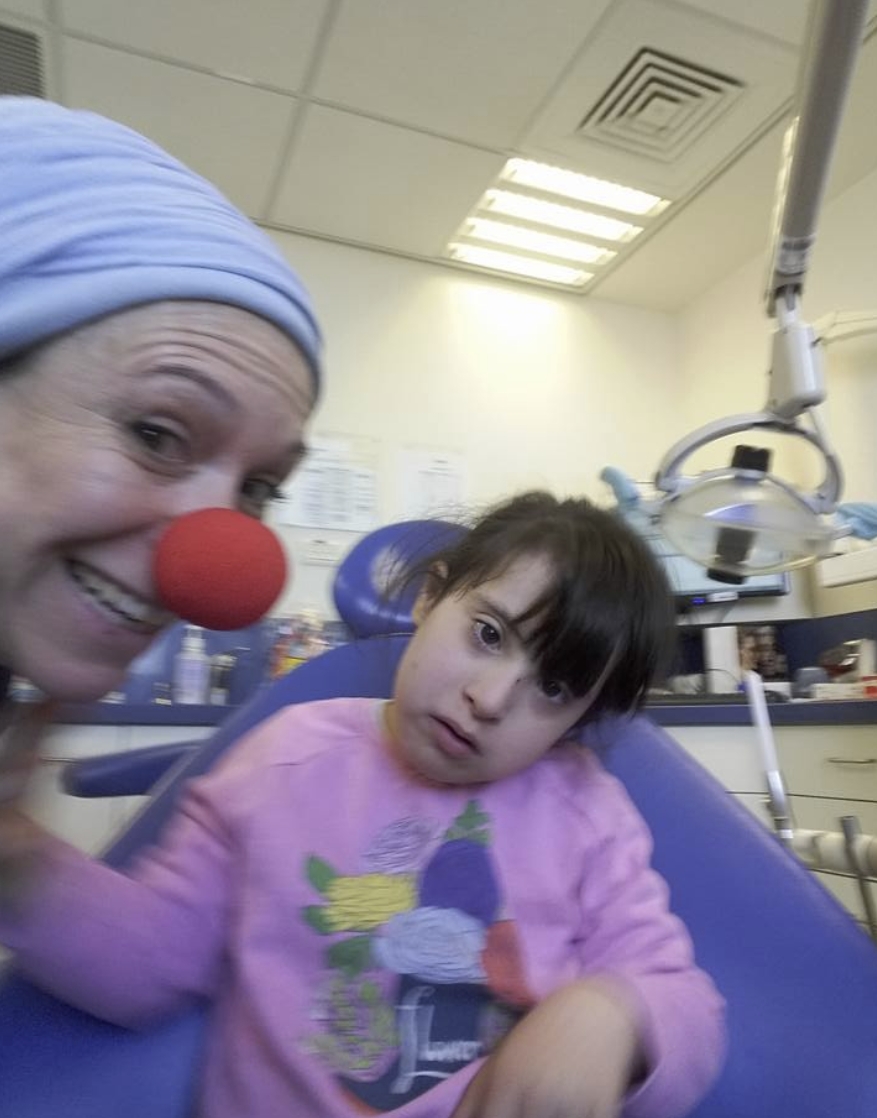A Laughing and Crying Eye: The Medical Clown Raising Special Children
Hani Yonah discovered her path fifteen years ago, and since then, she's had eight children, two with special needs. How does she navigate her daily life? And what did she do when she discovered some of her children chose a different path? "I didn’t become a medical clown by accident," she says, "Laughter helps me overcome obstacles."
 In circle: Hani Yonah (Photos: from Facebook)
In circle: Hani Yonah (Photos: from Facebook)"Oh, I want to say hello, but I can't," Hani Yonah stands before a little girl about to undergo a complex medical procedure. The girl stubbornly refuses to let the doctors approach her, crossing her arms defiantly, but Hani doesn't get flustered.
"Have your hands gone missing?" she asks in her funny voice and starts searching for the girl's hands. "Could they be in your hair? Maybe in your legs? Hiding in your skirt?" In just a moment, the girl is rolling with laughter, her crossed arms loosening, and that's precisely when Hani hugs her and whispers a few more funny sentences in her ear. Then, miraculously, the girl who was just a moment ago flatly refusing treatment informs her parents she's ready to proceed, on the condition that Hani stays by her side to keep her laughing.
Hani stays by the bed, singing funny songs, mimicking the doctor's movements through pantomime, and bringing lots of laughter and joy.
"These moments give me the most strength," Hani tells us later. "Although I went through formal clowning training only two years ago, I'm already instructing 'clowning apprentices,' and those who know me well know I have always been a clown. It's my nature, and it helps me overcome many difficulties in life."

"Why Should I Miss Out on Happiness?"
Hani is not just a medical clown; she is also the mother of eight children, two of whom have special needs. "Fifteen years ago, I returned to faith," she recounts, "I went through a challenging period of adjustment to my new religious life and later faced the not-easy challenges of raising my precious children, each of whom has taught and strengthened me in different ways."
The first significant difficulty she encountered was about eighteen years ago when her son was born with severe hearing impairment. "Around the age of one, when we realized he wasn’t hearing us, I tried to ask myself what my role as a mother was. I concluded that I shouldn’t think about what will be tomorrow or the day after, and certainly not what could have been if things were different. My role is to give each of my children the strength they need where they are, here and now, to think about how to strengthen and uplift them at their own pace."
It quickly became clear to her that what the hearing-impaired child needed most was independence. "I let him try everything possible; we didn’t protect him any more than any other child. At a very young age, I allowed him to travel by train alone, giving him diagrams, guidance, money in his wallet, and sent him on his way. To say I wasn’t scared? That would be a lie. The truth is, my heart was very heavy, but I knew I was doing the right thing. When Avigail, our eighth child, was born, and they told us she had Down syndrome, I felt that the same task lay before me – to give her full independence and treat her precisely like any other child, which has indeed led her to genuinely behave like any other child in every way. Only this week, there was a test in her class, and she was worried she’d fail, so she came to me with a serious look and said: 'Mom, today I’m not going to school, write a note to the teacher that I didn’t feel well...'"
 Avigail, Hani's daughter
Avigail, Hani's daughterBy the way, Hani notes that one thing that gives her strength in raising Avigail is the wonderful framework she learns in – the 'Tzohar Halev' school in Rechasim, where she enjoys great friends and an exceptionally dedicated staff, who constantly think about how to advance her.
Hani is an open, happy, and easygoing person, unafraid to talk about everything. "My family is wonderful and amazing. I've been blessed with five wonderful sons and three daughters, but the growth isn't always easy for me. Unfortunately, not all my children go in the direction I chose, and some have gone through spiritual upheavals. Traditional yeshivas were difficult for them, so I send some to the 'Zoharim' youth village, and some are in the 'Kfar HaZitim' boarding school in Tiberias. One of them sat at home for a whole year because we didn’t find him a framework, and it was not an easy trial. Yes, I would have been happy to see them all in black-and-white uniforms, going to holy yeshivas and studying persistently, but I realized reality doesn't always align with my aspirations. Instead of looking for what I don’t have, I thank Hashem for what I do have and for not losing my children. My feeling is that if not all go the way I chose, at least let them all be happy. Why should I lose out on happiness as well?"
This feeling is what led her, she says, the last time she volunteered as a medical clown in a hospital, to bring her eldest son with her. "He came with me, we laughed together and made everyone laugh, and we walked with our heads held high, with me proud of him and him proud of me."
The Secret: Stay Joyful
Recently, Hani participated in a show featuring four other mothers of children with special needs. "We put on a joint performance where I shared my personal story," she says. "I told the audience how during Avigail’s pregnancy, we weren't told she had Down syndrome. The doctors only suggested she might have holes in her heart, but not a word about the syndrome. A day after the birth, my husband and I were sat down with the department team, the social worker, and the head nurse, and were informed that our daughter has Down syndrome. My husband and I were silent. The team asked: 'Do you want to say something?' and we just smiled. My husband said, 'We already have a hearing-impaired child, and now there will be a child with a syndrome, we will handle it.' We left strong, but the next day when the social worker came to my room, she found me crying and crying...

She sat beside me with a sad look that only made me tear up more and empathized: 'Yes, yes, I knew you would eventually break down and cry.' I couldn't stand the sorrowful expression on her face. I told her: 'You can hold your head high, you don’t need to comfort anyone here.' I continued: 'You probably think I’m crying because I'm starting to digest that I have a child with Down syndrome, but that’s not true. I’m crying for a different reason. A few years ago, I became a believer, and I understand that my special children came from the Creator. These tears are tears of emotion. I’m telling the Master of the Universe: How amazing it is that you chose me, that you understood I am the person worthy of receiving such special souls and doing something with them. This is why I’m crying.'"
Then, Hani says, she also added a request to the social worker: "Please, the next time you visit other mothers, come with a bit more of a smile because the fact that you entered with such a sorrowful expression only made me feel worse." At that point, both of them allowed themselves to laugh.
By the way, Hani mentions that she tries not to utter these words to parents who have just given birth to their special child. "I’m often asked to come and talk to parents of special children, and I always avoid telling them what I truly and genuinely believe: 'You’ve received a gift, how nice for you,' although in my heart I know this to be true, but the parents don’t want to hear this, and it doesn’t interest them at the initial stage."

So, what should be said?
"I think the right thing to say initially is that, as every parent knows, every child has their own difficulties. There’s no escaping that. Reality can’t be changed, but we can either fall into depression and see everything as black, or we can embrace the special child and say: 'This is what we’ve received, this is our child, therefore it's clear we have the strength to care for them.' This soul has descended from the heavens exactly for us."
Three years ago, some rabbi’s wife called Hani and told her: "A family in our community had a child born with Down syndrome, and they’re hiding it from the entire family, not leaving the house or making any contact..." She asked Hani to come to them to provide some encouragement.
"I arrived and entered the house," Hani recounts, "and started talking with the woman and her husband. Initially, there was shock; they didn’t understand what I wanted from them. But eventually, we talked for over three hours. I candidly told them how such children give strength to their parents and those around them, promising them they’d see that from now on their entire household would change, and their older children would become more compassionate and gentle. Since I’m closely familiar with the fears of older siblings, I explained that they set the tone in the house. If they, as parents, aren’t ashamed of the baby but go out with the baby and act naturally, the children will feel the same way. I left their home at midnight, and by the next day, the woman's mother-in-law called me to say thank you. She told me the parents contacted the entire family, told them about the baby, and invited them for *Shabbat* kiddush.
Why do your words resonate with people?
"Maybe it's because I speak from my life experience," she muses, "and maybe it's because of the humor I was blessed with because often I call people, and as soon as they pick up, they start laughing, because my voice already amuses them. At those moments, I know I've reached their heart, and I can continue speaking. They will listen..."

